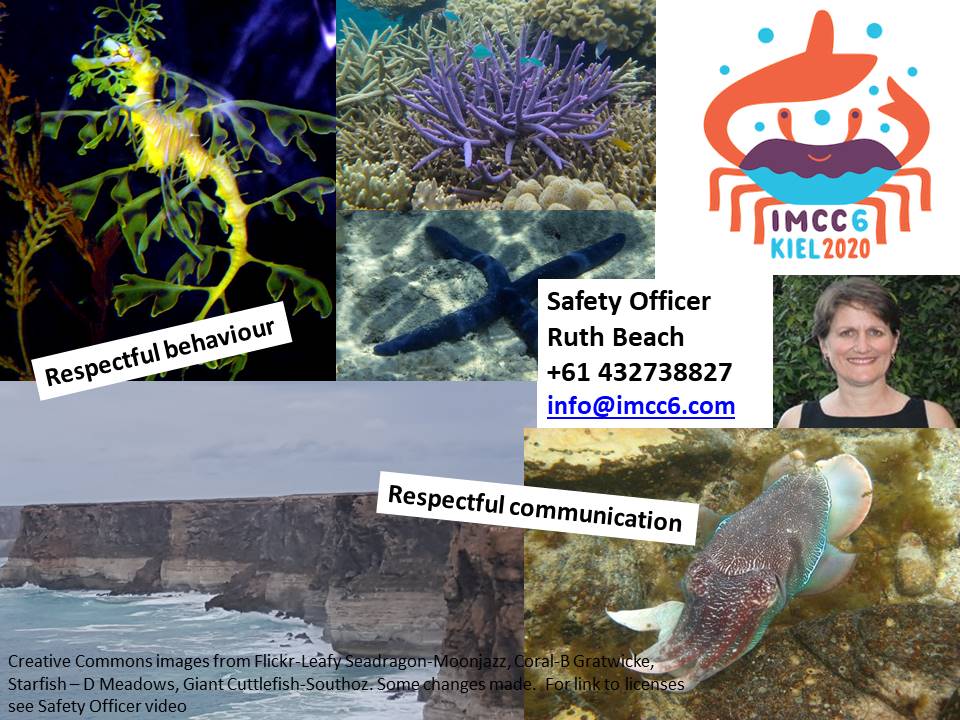Code of Conduct for the International Marine Conservation Congress

IMCC6 Code of Conduct
The mission of IMCC6 is making marine science matter. Topics arising during the meeting may arouse debate, and strong disagreements may occur. We see this as an asset – it is our explicit mission to set up a space so that these discussions can happen. However, there is a line between debate and disrespect – and if that line is crossed, the space is no longer productive. IMCC6 offers a a safe, equable, inspiring space for delegates from around the world. Our respectful dialogue policy asks that participants maintain constructive discourse with other conference attendees at all times.
To that end, we expect everyone to abide by the following Code of Conduct:
Expected Behaviour
- Treat everyone with respect and consideration.
- Communicate openly and thoughtfully with others and be considerate of the multitude of views and opinions that are different than your own.
- Be respectful and mindful in your critique of ideas.
- Be mindful of your surroundings and of your fellow participants. Alert SCB staff if you notice a dangerous situation or someone in distress.
- Respect the rules and policies of the conference centre and all venues associated with IMCC6.
Unacceptable Behaviour
- Harassment and intimidation, including any verbal, written, or physical conduct designed to threaten, intimidate, or coerce another delegate, conference organizers, or staff.
- Discrimination based on gender or gender identity, sexual orientation, age, disability, physical appearance, body size, race, religion, national origin, or culture.
- Physical or verbal abuse of any attendee, speaker, volunteer, exhibitor, SCB staff member, service provider or other meeting guest.
- Examples of unacceptable behaviour also include, but are not limited to: inappropriate use of nudity and/or sexual images in public spaces or in presentations; threatening or stalking any IMCC6 participant; sexually harassing any IMCC6 participant.
- Disrespectful disruption of presentations.
Consequences
- Anyone requested to stop unacceptable behaviour is expected to comply immediately.
- IMCC6 staff (or their designee) or security may take any action deemed necessary and appropriate, including immediate removal from the meeting without warning and potentially without refund.
- SCB and the SCB Marine Section reserve the right to prohibit attendance at any future meeting for occurances of unacceptable hehavirour.
Reporting Unacceptable Behaviour
- If you are the subject of unacceptable behaviour or have witnessed any such behaviour, please immediately notify the IMCC6 Safety Officer, an IMCC6 staff member, or SCB Marine Section volunteer in a leadership position. For delegates who wish to lodge a complaint of harassment, the trained IMCC6 Safety Officer will be available and readily identifiable. Notification should be done by contacting IMCC6 Safety Officer on-site or e-mail your concern (the IMCC6 Safety Officer’s email address will be conformed in advance of the meeting).
- You may also notify us here if the Safety Officer is unavailable. Please be sure the subject line reflects the urgency of the situation.
- For matters of immediate physical safety, you may also approach the onsite IMCC6 security guard.
- Reporting should never be done via social media.
IMCC6 Safety Officer
More information on IMCC6's Safety Officer will be shared when available. Thank you for your patience.
Favaro, B., Oester, S., Cigliano, J.A., Cornick, L.A., Hind, E.J., Parsons, E.C.M., Woodbury, T.J. 2016. Your science conference should have a code of conduct. Frontiers in Marine Science.
